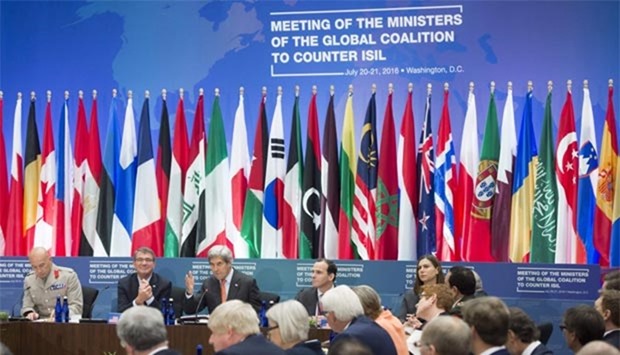Top diplomatic and military officials from the US-led coalition fighting the Islamic State group met on Thursday to prepare the assault on its Iraqi bastion Mosul.
Defence and foreign ministers from more than 40 countries gathered in Washington for a second day, even as their local militia allies made advances in Syria.
But, while news from the front was dominated by the Syrian Democratic Forces' siege of Manbij, the leaders in Washington were focused on a far bigger prize.
"Mosul will be the ultimate test," Brett McGurk, the US special presidential envoy to the Global Coalition to Counter ISIL, told the assembled delegates.
Backed by coalition air strikes and military advisers, Iraqi and Kurdish force have made inroads in recent months into territory once controlled by IS fighters.
But the daunting target of Mosul, Iraq's second city home to 2mn people, will be the centre of gravity on the campaign in the weeks and months to come.
On the first day of the talks, the defence ministers met separately to talk battlefield tactics, while the foreign ministers pledged $2bn in reconstruction funds.
Thursday's meeting brought them together to discuss how to ensure that any victory in Mosul is quickly followed by a political settlement and the return of refugees.
"Let us remember, Mosul is where Abu Bakr al-Baghdadi declared his phony caliphate in June of 2014," McGurk said, referring to the IS group's elusive leader.
"And if we get this campaign right on the ground, in all its aspects, it is where we can begin to seal his fate."
The battle for Mosul and for the Islamic State group's Syrian base Raqa will be tough if the jihadists decide to hold out in their symbolic strongholds.
But the Iraqi city also poses a political challenge.
End of the 'caliphate'
The remaining civilian population is mainly Sunni Muslim -- albeit with a historical Christian minority -- and distrustful of the Shia-led Baghdad government.
The city is also close to the fracture line between Iraq's autonomous Kurdish region and the Arab centre, a point of tension between the local anti-IS forces.
The challenge facing the ministers in Washington -- including Iraqis and Kurds -- was to agree on how post-war Mosul will be rebuilt and governed.
"Mosul will be the most complex operation to date," McGurk said, warning that a million civilians from diverse ethnic and religious groups are still inside the city.
Nevertheless, McGurk said the plan is "well underway" with an agreement on the type and number of Iraqi and Kurdish troops and militia to be used in the assault.
Critically, there has been an agreement that 15,000 locally recruited troops from Mosul's Nineveh province -- largely Sunni Arabs -- will be involved.
In light of the coalition's experience after the liberation of Tikrit, Ramadi and Fallujah resources will be set aside for refugee camps and reconstruction.
"I believe thanks to the pledging conference yesterday and the meetings we're having this week that that foundation is being set," McGurk said.
"The liberation of Mosul -- and of Raqa -- is now an achievable objective and it's one we must get right."
US Defense Secretary Ash Carter and Secretary of State John Kerry, who are co-chairing the meeting, said that driving IS out of Iraq and Syria was possible and necessary.
But both warned that, while denying the group space to train, plan and spread propaganda, removing it from the territories it has occupied would not end its ability to inspire attacks far from its heartland.
"So today, we can look forward without exaggeration, to a time when Daesh is driven completely out of Iraq and Syria," Kerry said, welcoming the allied envoys.
"Without a territorial base, Daesh will no longer be able to boast about a caliphate. Its narrative will change. It will have to change.
"But everybody here knows that Daesh is still going to be dangerous," Kerry warned, having earlier paid tribute to the victims of last week's truck attack in Nice.

US Defense Secretary Ashton Carter and US Secretary of State John Kerry host a meeting of the Ministers of the Global Coalition to Counter ISIL at the State Department in Washington, DC, on Thursday.
